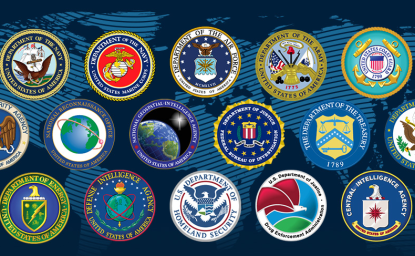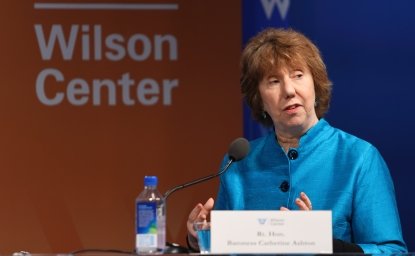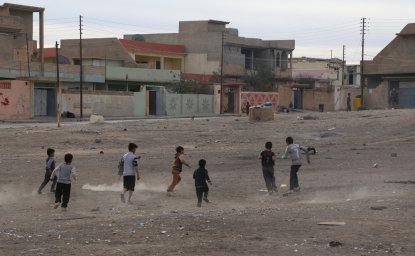On May 30, Ambassador at Large and Coordinator for Counterterrorism Nathan Sales outlined the United States and its partner's roles in countering violent extremism. "At the State Department, we’re focused on aligning civilian responses to terrorism with military ones," Sales said at the Hudson Institute. "That’s the only way to ensure the lasting defeat of our enemies." The following is a video and text of Sale's full remarks.
The State Department's Role in Countering Violent Extremism
We’re at a vital moment in our fight against terrorism. We’ve made extraordinary progress against ISIS on the battlefield over the last year. Nearly all the territory ISIS once controlled in Iraq and Syria has been liberated. This fight wasn’t easy. Our partners on the ground fought mile by mile, even house by house, to rid Raqqa and the surrounding Syrian countryside of this threat.
Yet our victories on the battlefield are not a permanent solution. At the State Department, we’re focused on aligning civilian responses to terrorism with military ones. That’s the only way to ensure the lasting defeat of our enemies.
Our civilian efforts include law enforcement tools – prosecuting terrorists, collecting battlefield evidence, and updating laws to more effectively target the threat. We’ll need tougher border screening and more robust information sharing – both within governments and among them. We’ll need to designate and sanction ISIS affiliates and financiers to cut off the flow of money.
Another key civilian tool is Countering Violent Extremism, or CVE. But I think we need to be more ambitious than its name suggests. In addition to countering the violence, we also need to counter the underlying ideas that give rise to it.
ISIS, al-Qa’ida, and other terrorist organizations continue to radicalize and recruit. Their messages transcend borders. Over the last twenty years, this call to violence has resonated in the Middle East, Asia, Africa, Europe, and here in the United States. Despite our military success, young men and women across the world are still being convinced to join ISIS and al-Qa’ida or carry out attacks in their name.
The United States and our partners must persuade them otherwise. We must engage in a contest of ideas.
Today, I’d like to talk about American values and the threat posed to them by terrorist ideology. Then I’ll discuss some of our natural allies in this contest, and wrap up by describing what the State Department is doing to promote our values and interests.
A Page of History
A contest of ideas is not unique to our fight against terrorism. Throughout history, our conflicts have often had ideological dimensions.
During the Cold War, our objective was to contain and then roll back the Soviet empire. But we had to go beyond that. We needed to show that the ideology on which the Soviet system was based was false – that its teachings ran counter to the most basic human desires for freedom and dignity.
And so we engaged in the debate through Voice of America, Radio Free Europe, and countless other platforms to advance the values we share with our allies and partners. We were out to persuade the world that Soviet ideology was wrong – both morally and as a system of governance. And we succeeded.
Ideas matter. And where we find ideologies that espouse violence, deny freedom, and reject human dignity, we must stand with our partners against these threats to our fundamental values.
Winston Churchill put it best: “Arms … are not sufficient by themselves. We must add to them the power of ideas. People say we ought not to allow ourselves to be drawn into a theoretical antagonism between Nazidom and democracy; but the antagonism is here now. It is this very conflict of spiritual and moral ideas which gives the free countries a great part of their strength.”
American Values and Terrorist Ideology
So, what are the competing ideologies in today’s contest of ideas?
America is committed to individual rights, and we recognize the inherent worth and dignity of every human being. We are all, in the words of the Declaration of Independence, endowed by our Creator with certain unalienable rights, including life, liberty, and the pursuit of happiness.
From this we derive a number of specific values:
We’re committed to religious liberty – our first freedom. This is not just, as some would have it, a mere “freedom of worship.” Our Constitution guarantees us the free exercise of religion – conduct as well as expression.
We’re also dedicated to the notion of equality before the law. We fought a civil war for this principle, then we implanted it in our Constitution in the form of the Fourteenth Amendment.
We’re committed to pluralism. We acknowledge that our fellow citizens will often disagree with us on great questions of morality and religion. We’re okay with that. And we expect our government to be okay with it too. We deny officials any authority to mandate uniformity of thought.
Here’s how the Supreme Court put it in a WWII era case: “If there is any fixed star in our constitutional constellation, it is that no official, high or petty, can prescribe what shall be orthodox in politics, nationalism, religion, or other matters of opinion, or force citizens to confess by word or act their faith therein.”
These rights and liberties are the entitlement of every American, no matter their background, no matter their creed. Let me tell you about Holt v. Hobbs, a Supreme Court case from 2015 that nicely illustrates our national commitment to liberty, equality, and pluralism.
Gregory Holt, an inmate in Arkansas, wanted to grow a half-inch beard, which he believed was required of him as an observant Muslim. Prison guards barred him from doing so, citing the state’s penal regulations. He filed suit, and the U.S. Department of Justice took his side, defending his right to freely exercise his religion.
The Supreme Court’s decision was unanimous. It held that Gregory Holt was entitled to an exemption from the ban on facial hair. Arkansas’ interest in prison discipline had to yield to the inmate’s right to religious liberty.
Our adversaries reject all of this.
ISIS and al-Qa’ida deny the worth and dignity of the individual. Here’s how Osama bin Laden once put it: “We love death. The U.S. loves life. That is the big difference between us.”
Indeed it is.
Today, we see the toll this bloody ideology is exacting on the world. It’s responsible for the deaths of countless Iraqis and Syrians, approximately 100,000 Afghans, and, on 9/11, close to 3,000 people from over 90 countries. Its followers have enslaved women and girls from their families. They’ve beheaded sons on television. They’ve burned people alive, thrown them from the tops of buildings, and drowned them.
Our enemies are not shy about the ideas that inspire this brutality.
Our enemies reject religious liberty – indeed all liberty – as they seek to rule by constant bloodshed. They reject equality and seek to empower themselves at the expense of those they regard as their inferiors. And they reject pluralism because they regard any other religion – indeed, any other tradition within Islam itself – as a crime punishable by death.
Allies and Partners
And so as we confront terrorists on the battlefield, in courts of law, and in other theaters, we also must confront the twisted ideas they use to justify their barbarism.
We have allies in this effort. We need to work with partners who share our values and who can credibly refute the violence, supremacism, and intolerance of our enemies. We need to partner with government officials, but also with community leaders, religious figures, and others who have the standing to counter terrorist ideology.
Luckily, it’s easy to find partners like these. I’ve met many of them since I took office less than a year ago. Let me give you a few examples.
Indonesia
Southeast Asia is no stranger to terrorism. Last year, we saw ISIS seize a city in the Philippines. And earlier this month, terrorists carried out a series of attacks on churches and a police station in Surabaya, Indonesia.
I recently met with Indonesians who are working hard to counter terrorist ideology in their country, and across the entire region.
Indonesia is a potent antidote to extremism. It’s home to the largest Muslim population in the world, and it boasts a long history of religious tolerance and pluralism.
Last year, a group of students in Indonesia published an 8,000 word “Declaration on Humanitarian Islam” that reflects the best of their country’s traditions. Their agenda focuses on three priority areas. They want to increase religious understanding and mutual respect, emphasizing what they term the “humane and spiritual dimensions” of their faith. They want to promote critical thinking skills. And they want to empower civil society to deter extremism.
It’s voices like these that must be amplified. They share the values America holds dear, and they’re critical partners in our effort to defeat terrorist ideology.
Jordan
Like Indonesia, Jordan is also a center of pluralism. Top Jordanian officials have supported interfaith dialogues that call for peace and tolerance, both within the Islamic community and with other religious groups.
They’re also tackling the inconsistencies between religious texts hijacked by ISIS and the intellectual and philosophical legacies within Islam. They are scouring scripture to expose the illegitimacy of terrorists’ claims from within their own tradition.
For example, one Jordanian scholar has said, “A tiny minority of Muslims have fundamentally misunderstood Islam and are grossly misrepresenting it…. True piety necessarily involves virtue and kindness towards others – all others – because kindness is the fruit and result of love…. We were created to be kind to our neighbors, no matter who they are or what their faith.”
Morocco
Morocco is another partner with a strong commitment to pluralism.
To stem the growth of extremism, in 2015 the King established the Mohammed VI Institute for the Training of Imams. The Institute also trains male and female religious guides known respectively as “Morchidines” and “Morchidates”. Its mission is to promote religious scholarship and a message of tolerance, particularly in Africa.
Today, this school attracts students from across the continent – and from Europe as well. A student body of over 1,200 per year hails from Morocco, Guinea, Côte d’Ivoire, Tunisia, Mali, Chad, Nigeria, Senegal, and France.
Initiatives like this are growing a cadre of informed and authentic voices that will ultimately drown out the extremism preached by ISIS and al-Qa’ida.
The U.S. Role
So what’s the role of the United States in all of this?
Candidly, I think we need to approach that question with a healthy dose of modesty. The federal government is not a religious authority – I certainly am not – and there are limits to our ability to disprove our adversaries’ theological claims. What we can do is partner with leaders and authorities who share our values.
Let me tell you about what the Counterterrorism Bureau and the State Department generally are doing to support our friends in this contest of ideas.
Counter-Messaging
First, we’re promoting authentic voices that are committed to pluralism and human rights, and that can speak credibly to those at risk of buying into terrorist ideology.
One example is the Sawab Center, a partnership with the United Arab Emirates. “Sawab” is an Arabic word that means “on the right path.” The Center develops and disseminates content that challenges ISIS narratives. Recently, it launched an internet campaign on the importance of giving to verified charities; it was viewed over a million times.
We’ve also supported community leaders to develop tailored messages for local audiences. In Southeast Asia, we trained university and high school students to create and share videos on peace, tolerance, and alternatives to terrorism and the ideology behind it. Students learned how to operate a video camera, write a storyboard and script, and edit their work. They then held video screenings and discussions that reached thousands of other students.
In another initiative, we supported a documentary by mothers whose sons went to Syria to fight with ISIS. This widely viewed film showed the devastation families experience when their sons and daughters abandon them for a life of violence. It forced would-be recruits to think twice about their support for terrorism, and to confront the false ideas that encouraged them in the first place.
Community Engagement
Second, we’re engaging with the communities most affected by terrorist messaging. Civic leaders are often the first ones to spot the signs of radicalization. They’re an early warning system and an early intervention mechanism.
When young people are on a path to terrorism, it’s important to connect them and their families to religious figures, mentors, and other stakeholders in their communities. They need to hear strong, authentic voices whose messages of non-violence and tolerance will resonate.
That’s why the CT Bureau supports the Strong Cities Network, which now includes more than 100 cities from around the world. Under the City Pair Program, we’ve matched cities in the United States with counterparts abroad and encouraged them to share good practices on countering terrorism.
These exchanges have produced real results. A few years ago, we paired Vilvoorde, Belgium with Columbus, Ohio. At the time, Vilvoorde, a city just north of Brussels, had one of the highest per capita numbers of foreign terrorist fighters who traveled to Syria and Iraq.
The Belgian delegation included Mayor Hans Bonte (Bon-TEE), the chief of police, and community leaders. In Ohio they met with a number of local figures, including officials from the Hilliard City school district. Hilliard has become one of the most diverse districts in the country, due to a large influx of immigrants from Somalia. Columbus has worked to integrate these kids and build their resilience to harmful outside influences.
When he returned to Vilvoorde, Mayor Bonte implemented new community engagement and resilience techniques. A few months later, Vilvoorde noted a precipitous drop in foreign terrorist fighters … down to zero. Vilvoorde is now a member of the Strong Cities Network and Mayor Bonte regularly speaks with mayors around the world about its efforts.
Deradicalization and Reintegration
Finally, we’re working to deradicalize those who’ve proved susceptible to terrorist ideology.
One of the groups we’re focusing on is prisoners. We all know the story of al Qa’ida’s origins, with Ayman al-Zawahiri and others who were further radicalized in Egyptian prisons. In the past several years, we’ve seen former prisoners go on to commit attacks in Denmark and Belgium, among other places. And as we prosecute terrorist fighters captured on the battlefield and send them to jail, we need to prevent them from radicalizing their fellow inmates.
At the same time, prisons can also present deradicalization opportunities, with inmates cut off from their previous networks and contacts.
In Kosovo, for example, we’re launching programs to help prison officials manage and rehabilitate terrorist fighters who’ve returned home and other terrorist offenders. We’re helping the Kosovars develop standard operating procedures for managing terrorist inmates, and instructing officers how to monitor their communications and activities.
Of course we can’t limit our efforts to prisoners. We also have to reach people before they commit crimes that might land them in jail.
That’s why we helped create Hedayah, an international training center based in Abu Dhabi. One of Hedayah’s most important projects is its counter-narrative library, which includes defector narratives from former terrorists. Many who left ISIS and other groups became disillusioned with them because of their brutality – particularly toward fellow Muslims.
Hedayah has used this library to create regional training guides on crafting messages to dissuade would-be terrorists. These narratives demonstrate that wherever terrorist ideology begins to take hold, we can also free people from its clutches.
Conclusion
In conclusion, ISIS is down but it’s not out. In Southeast Asia, the Sahel, East Africa, Europe, and South America, the threat of terrorism and the ideas that animate it are very real. And they’re growing.
Our military victories buy us time to win a more fundamental contest: a contest between competing ideologies.
This essential work will require determination and patience. But I’m confident that, with the will and commitment of our partners, our ideas will prevail – just as they have in the past.
Click here for the full remarks.

The Islamists
Learn more about Hamas and how it relates to similarly aligned organizations throughout the region. Read more

Explore More
Browse Insights & Analysis
An Act of Terror Cannot Occur on Russian Soil

US Intel: ISIS, al Qaeda, Hamas, & Hezbollah

